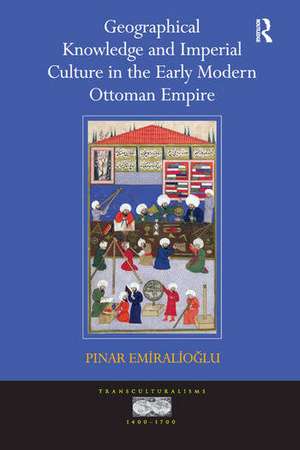Geographical Knowledge and Imperial Culture in the Early Modern Ottoman Empire: Transculturalisms, 1400-1700
Autor Pinar Emiraliogluen Limba Engleză Paperback – 26 aug 2016
Din seria Transculturalisms, 1400-1700
-
 Preț: 436.14 lei
Preț: 436.14 lei -
 Preț: 387.20 lei
Preț: 387.20 lei -
 Preț: 390.46 lei
Preț: 390.46 lei -
 Preț: 489.26 lei
Preț: 489.26 lei -
 Preț: 385.74 lei
Preț: 385.74 lei -
 Preț: 385.62 lei
Preț: 385.62 lei -
 Preț: 381.92 lei
Preț: 381.92 lei -
 Preț: 416.22 lei
Preț: 416.22 lei -
 Preț: 489.26 lei
Preț: 489.26 lei - 21%
 Preț: 241.15 lei
Preț: 241.15 lei - 18%
 Preț: 1111.40 lei
Preț: 1111.40 lei -
 Preț: 409.48 lei
Preț: 409.48 lei -
 Preț: 381.81 lei
Preț: 381.81 lei -
 Preț: 474.73 lei
Preț: 474.73 lei - 17%
 Preț: 258.70 lei
Preț: 258.70 lei - 30%
 Preț: 847.73 lei
Preț: 847.73 lei -
 Preț: 469.34 lei
Preț: 469.34 lei -
 Preț: 469.34 lei
Preț: 469.34 lei -
 Preț: 498.91 lei
Preț: 498.91 lei - 18%
 Preț: 1113.95 lei
Preț: 1113.95 lei -
 Preț: 449.41 lei
Preț: 449.41 lei -
 Preț: 429.05 lei
Preț: 429.05 lei -
 Preț: 388.08 lei
Preț: 388.08 lei -
 Preț: 411.42 lei
Preț: 411.42 lei - 18%
 Preț: 1054.71 lei
Preț: 1054.71 lei - 28%
 Preț: 821.13 lei
Preț: 821.13 lei -
 Preț: 469.34 lei
Preț: 469.34 lei
Preț: 324.16 lei
Preț vechi: 432.00 lei
-25% Nou
Puncte Express: 486
Preț estimativ în valută:
62.05€ • 67.42$ • 52.15£
62.05€ • 67.42$ • 52.15£
Carte tipărită la comandă
Livrare economică 21 aprilie-05 mai
Preluare comenzi: 021 569.72.76
Specificații
ISBN-13: 9781138247543
ISBN-10: 1138247545
Pagini: 210
Dimensiuni: 156 x 234 mm
Greutate: 0.45 kg
Ediția:1
Editura: Taylor & Francis
Colecția Routledge
Seria Transculturalisms, 1400-1700
Locul publicării:Oxford, United Kingdom
ISBN-10: 1138247545
Pagini: 210
Dimensiuni: 156 x 234 mm
Greutate: 0.45 kg
Ediția:1
Editura: Taylor & Francis
Colecția Routledge
Seria Transculturalisms, 1400-1700
Locul publicării:Oxford, United Kingdom
Notă biografică
M. Pinar Emiralioglu is Associate Professor of History at Sam Houston State University, USA.
Recenzii
'This book deserves attention both for its theoretical sophistication and for the extraordinary variety of its sources. By bringing together maps and travel narratives with works of cosmography, administrative documents, and even poetry, Emiralioglu has forged an innovative and thought-provoking framework for understanding the Ottomans' views of the world and their own place within it.' Giancarlo Casale, author of The Ottoman Age of Exploration 'Pınar Emiralioglu’s new book skillfully weaves together an analysis of sixteenth-century geographical and cartographical texts in Ottoman Turkish and a synthesis of scholarly work on Ottoman and other early modern imperial cultures.' American Historical Review ’...EmiralioÄŸlu’s book opens a new understanding into Ottoman geographical and cartographical tradition and has the potential of being a source of inspiration for furthering researches on the topic.’ Studies in Ottoman Science
Cuprins
List of Figures, List of Plates, List of Maps, List of Abbreviations, Note on Transliteration, Translation, and Pronunciation, Acknowledgements, Introduction: Eye of the World: Textual and Visual Repertoires of the Sixteenth-Century Ottoman Empire, 1 Negotiating Space and Imperial Ideology in the Sixteenth-Century Ottoman Empire, 2 Mapping and Describing Ottoman Constantinople, 3 Charting the Mediterranean: The Ottoman Grand Strategy, 4 Projecting the Frontiers of the Known World, Epilogue: Ottoman Geographical Knowledge in the Long Eighteenth Century, Bibliography, Index
Descriere
Exploring the reasons for a flurry of geographical works in the Ottoman Empire in the sixteenth century, this study analyzes how cartographers, travelers, astrologers, historians and naval captains promoted their vision of the world and the centrality of the Ottoman Empire in it. It proposes a new case study for the interconnections among empires in the period, demonstrating how the Ottoman Empire shared political, cultural, economic, and even religious conceptual frameworks with contemporary and previous world empires.
